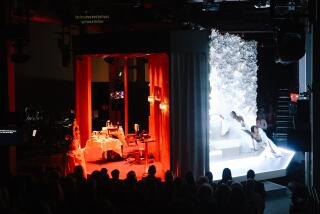THEATER REVIEW : ‘Hedda’ Inspires Sympathy for an Unsympathetic Character
- Share via
SAN DIEGO — CCH Pounder makes Ibsen’s Hedda Gabler a perfectly poisonous creature. But she also has no trouble drumming up interest in what makes Hedda tick.
By the end, we shed a tear for heedless Hedda’s self-destruction. What a bitter waste! It’s a formidable challenge to turn someone so unsympathetic into someone we care about, and Pounder pulls it off in Sheldon Epps’ intimate production of Ibsen’s “Hedda Gabler” at the Old Globe Theatre’s Cassius Carter Centre Stage.
Pounder’s Hedda sheds a tear herself in a dark and wordless scene before the dialogue begins. This telegraphing of her inner torment is a bit too obvious, but it’s a minor misstep.
Once Hedda starts surveying her new domain, the next morning, the action perks up. Without actually smacking her lips in glee, Pounder makes it clear how much Hedda enjoys toying with other people’s lives as a substitute for the development of her own.
Those other people include her new husband, played by John Leonard Thompson as a nice but naive guy, very amusing in his exchanges with his doting mother (Patricia Fraser). But of more interest to Hedda are her old soul mate Eilert Lovborg and his new soul mate, Thea Elvsted.
John Campion makes Eilert an obnoxiously self-dramatizing fellow. His husky whispers are like something out of a horror movie. But it works, for we can see how Hedda would be attracted to someone so theatrically commanding, as opposed to someone more “poetically” wispy. Dawn Akemi Saito establishes Thea’s winsome combination of fear and courage. No wonder Hedda is so jealous.
The only character Hedda can’t outfox is Judge Brack, played here by Ron Glass as a suave charmer. He’s so smooth, in fact, that one may wonder why Hedda finally finds the prospect of his power over her so repulsive. Certainly she finds this Brack more attractive than her own husband. Perhaps she’s turned off by his crude gesture with a cane during one of their conversations. And, of course, by the prospect of yet one more man dominating her, restricting her choices.
Although this Hedda enjoys herself during much of the first act, she is in agony by the end, and Pounder makes the journey seamless. Her emotions rise to the surface unforgettably during Hedda’s burning of Eilert’s manuscript and the swirling little dance she performs afterward. In a final coda, she enters the stage in a red gown, released at last from her boredom, her trusty pistol in hand.
The arena staging poses occasional sight line problems--from my seat, I couldn’t see either face when Hedda gave Eilert her pistol. Hedda’s piano also has been omitbecause of space constrictions, which means we don’t hear Hedda’s burst of wild energy shortly before her final gesture.
No matter. Pounder and a throbbing string score (Jeff Ladman designed the sound) keep the energy level intense, and the close-up views of this chamber drama increase its impact.
Those who are wary of “non-traditional” casting in the classics should definitely see this “Hedda.” Although actors are African American, Asian American and white--which looks designed to stack points in the multicultural sweepstakes--ethnic concerns vanish. Human concerns take over.
* “Hedda Gabler,” Cassius Carter Centre Stage, Old Globe Theatre, Balboa Park, San Diego. 8 p.m. Tuesdays-Saturdays; 2 p.m. Saturdays-Sundays. Ends June 18. $36. (619) 239-2255. Running time: 2 hours, 35 minutes.
More to Read
The biggest entertainment stories
Get our big stories about Hollywood, film, television, music, arts, culture and more right in your inbox as soon as they publish.
You may occasionally receive promotional content from the Los Angeles Times.










